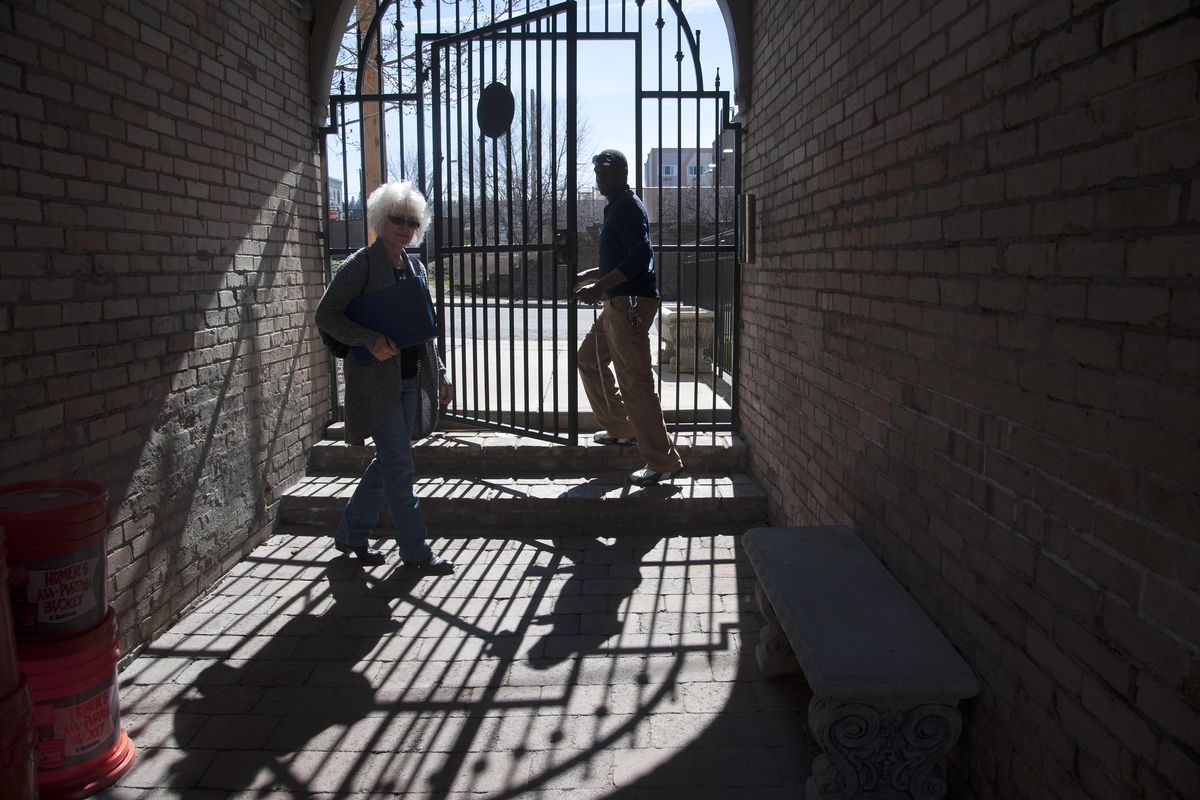COPS program coaches apartment managers on heading off problems

It’s a sunny March afternoon when Maurece Vulcano shows up to inspect the Kensington Court building.
Vulcano, the program manager for Spokane Community Oriented Policing Services, walks around the 32-unit, low-income apartment building with manager Will Jones. Located just east of downtown on Pine Street, the building stands out as a clean oasis in the surrounding grit of downtown litter and railroad tracks. The courtyard is immaculate, enclosed by the historic property’s original black gates.
Vulcano walks to the side of the building and points out a small piece of disorder: fresh graffiti spray-painted on the sign marking the building’s dumpsters.
“Two days ago, I found the best graffiti removal spray ever. Go get it!” she tells Jones. He chuckles and agrees to check it out. Later, he pokes fun at Vulcano’s zeal.
“I think I get more emails from you than I do my boss,” he tells her.
Wielding a blue clipboard with a checklist on top, Vulcano seems to have a endless supply of energy for preventing crime. She runs COPS’ crime-free rental housing program, which works to help landlords keep criminals off their properties through a combination of training and on-site inspections.
The premise behind the program, which started here in 1998, is simple. Rental properties can be headaches for police when managers are off-site, disengaged or otherwise not concerned about people selling drugs or breaking into the building. Though 25 percent of Spokane residents live in rental housing, those properties make up a majority of police calls for service, Spokane COPS executive director Patrick Striker said.
But stopping crime in rental housing is relatively easy, so long as managers care enough to put in some effort.
“Bad guys are like cockroaches: you turn on the lights and they run away,” he said.
COPS offers a 16-hour training to managers twice a year, focusing on topics like domestic violence, screening renters and working with police to report crime. Many of the managers work for larger property management companies like Kiemle & Hagood or Spokane Housing Ventures, and most manage low-income properties, Vulcano said. About 60 Spokane rental properties are certified under the program.
In addition to classroom training, managers in the program have annual walk-throughs to make sure their properties are up to snuff. Vulcano works with COPS volunteers to conduct those inspections, looking for things like adequate outdoor lighting, bushes trimmed so that people can’t hide behind them and sturdy deadbolts on doors.
The idea is the same one behind so-called “broken windows” policing: If your property is well-designed and looks like someone cares about it, it’s less likely to attract crime.
“If it looks like it’s not being taken care of, they’re going to swarm on it,” said Adam Dyer, the manager of Friendship Garden Apartments, a senior housing complex across from the East Central Community Center. Dyer recently moved to Spokane from Texas and said the class helped him get up to speed on Washington laws for landlord-tenant issues.
He was able to show graffiti around his property to a member of the police department’s gang unit, who told him it didn’t appear to be gang-related. Now, he said he’s more likely to notice graffiti and take action.
“When I see it now, it actually comes into my vision instead of my subconscious,” Dyer said.
Police officers use the same principles to work with individual landlords on problem properties. Downtown police officers worked with owners at the Maplehurst Apartment Building, where a rogue manager was subletting apartments without the owner’s knowledge. The owners started taking a more proactive approach to screening renters last fall. Police have received 33 calls for service at the building in the three months since the changes were made, compared to 53 in the three months before, downtown Lt. Bart Stevens said.
Even for Jones, who’s been through the training several times, Vulcano had suggestions. She told him he’d be better off with 3-inch screws holding the front door lock in place, since the more common 1.5-inch screws make the door too easy to kick in. When she visits a new property, Vulcano said she likes to take a screwdriver with her.
“I yank them out to see how long it is,” she said, pointing to the screws. “Nine times out of ten, they’re one and a half inch.”
Jones has lived in the Kensington Court building for 11 years. He started maintenance work there in 2008, then became manager a few years later when the previous manager left. The building’s location, across the street from a 7-Eleven and near the House of Charity, tends to attract homeless people who sometimes cause problems, Jones said.
His interest in crime prevention started after he got fed up seeing people go to the bathroom and shoot up drugs behind the bushes across the street. One day, he decided to tear out the bushes. Since then, he’s put people on notice that he’ll call police if he sees crime near his property. His lease has a crime-free requirement prohibiting drug use and other illegal activity.
“My tenants here are great,” he said.
Dyer said he wants to talk to neighbors about cleaning up graffiti and keeping shared property looking good.
“They really harped on the community coming together to solve the community’s problems,” he said. “Your problem is now my problem. And that’s the way it should be.”